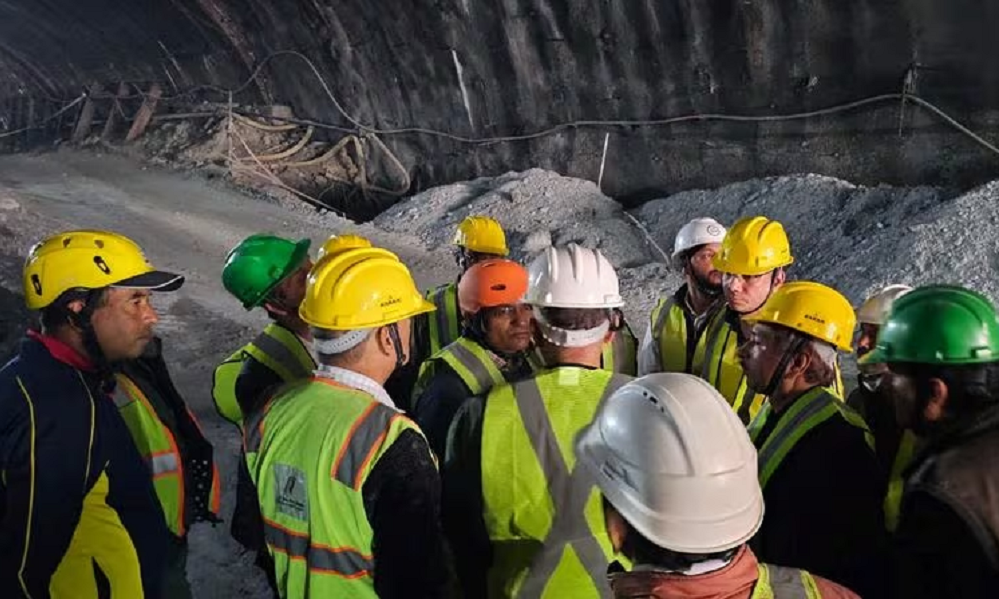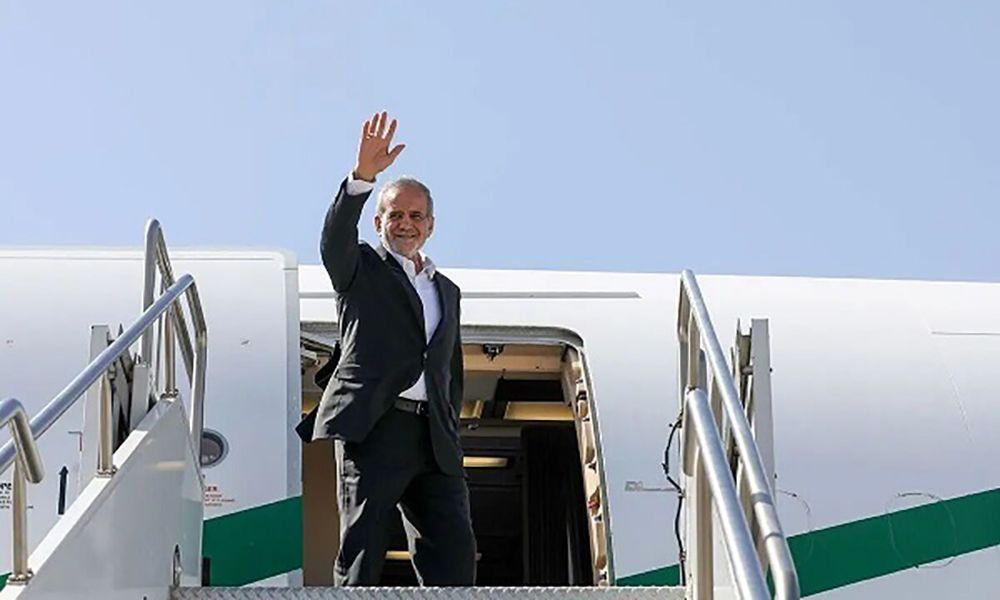Regional
Heavy machinery brought in to rescue Indian workers from collapsed tunnel

Excavators began drilling with heavy machinery on Tuesday to fix a wide steel pipe that will help pull out almost 40 Indian workers trapped inside a collapsed Himalayan highway tunnel that caved in two days ago in the north Indian state of Uttarakhand.
The 4.5-km tunnel, which was being built on a national highway that is part of a popular Hindu pilgrimage route, caved in around 5:30 a.m. on Sunday, Reuters reported.
"We have been supplying food, water and oxygen to the trapped laborers and the officials are in continuous touch with all of them," Devendra Singh Patwal, a disaster management official said.
Excavators have been removing debris for two days to carve out a path to reach the workers and had been awaiting delivery of a wide steel pipe which will be pushed into an opening of excavated debris to safely pull out the workers.
Patwal said it was not easy to ascertain the time required to pull out the workers.
A team of geologists from the state government and educational institutions had arrived to determine the cause of the accident, he added.
There were around 50 or 60 workers inside the tunnel and around 10 or 20 of them got out after their shift ended as they were closer to the exit and the rest were trapped after the collapse, the Indian Express newspaper reported, quoting one construction worker who made it out safely.
"Initially, we thought it might be a minor collapse and began removing the debris however we could," Rajeev Das, the worker, told the newspaper. "But soon, we realized it was a challenging search and rescue (mission)."
The region is prone to lan dslides, earthquakes and floods and the incident follows events of land subsidence in the state that geologists, residents and officials have blamed on rapid construction in the mountains.
The work on the tunnel stretch commenced in 2018 and was initially intended to be completed by July 2022, which has now been delayed to May 2024, an Indian government statement said.
Regional
Iran’s president to make rare visit to Egypt for D-8 summit
Iran will discuss regional and bilateral affairs with the participating countries on the sidelines of the summit, Baghaei added.

Iranian President Masoud Pezeshkian will take part in a summit of big Muslim countries in Egypt on Thursday, Foreign Ministry spokesperson Esmaeil Baghaei said, the first visit by an Iranian president to Egypt in more than a decade, Reuters reported.
Egypt is hosting the summit of the D-8 Organization for Economic Cooperation, which also includes Bangladesh, Indonesia, Malaysia, Nigeria, Pakistan and Turkey.
Relations between Egypt and Iran have generally been fraught in recent decades but the two countries have stepped up high-level diplomatic contacts since the eruption of the Gaza crisis last year as Egypt tried to play a mediating role, read the report.
Iran's Foreign Minister Abbas Araqchi travelled to Egypt in October to discuss regional issues with Egyptian officials, while his Egyptian counterpart Badr Abdelatty travelled to Tehran earlier in July to attend Pezeshkian's inauguration.
"We have the important summit... known as D-8 in Egypt, the foreign minister will take part in the ministerial conference and then the summit will be held with the participation of the president," Baghaei said in a weekly televised news conference.
Iran will discuss regional and bilateral affairs with the participating countries on the sidelines of the summit, Baghaei added.
The D-8 was established in 1997 to improve cooperation between countries stretching from Southeast Asia to Africa.
Regional
Bomb kills chief of Russian nuclear protection forces in Moscow

A bomb hidden in an electric scooter killed a senior Russian general in charge of nuclear protection forces in Moscow on Tuesday, Russia’s investigative committee said.
Lieutenant General Igor Kirillov, who is chief of Russia’s Nuclear, Biological and Chemical Protection Troops, was killed outside an apartment building on Ryazansky Prospekt, which starts a road some seven km (4 miles) southeast of the Kremlin, Reuters reported.
“Igor Kirillov, the head of the radiation, chemical and biological protection forces of the armed forces of the Russian Federation, and his assistant were killed,” the investigative committee said.
Photographs posted on Russian Telegram channels showed a shattered entrance to a building littered with rubble and two bodies lying in the blood-stained snow.
Reuters footage from the scene showed a police cordon. A criminal case has been opened.
Russia’s radioactive, chemical and biological defense troops, known as RKhBZ, are special forces who operate under conditions of radioactive, chemical and biological contamination.
On Monday, Ukrainian prosecutors charged Kirillov in absentia with the alleged use of banned chemical weapons in Ukraine, the Security Service of Ukraine said, according to the Kyiv Independent.
Russia denies those accusations.
Britain in October sanctioned Kirillov and the nuclear protection forces for using riot control agents and multiple reports of the use of the toxic choking agent chloropicrin on the battlefield.
Regional
Hezbollah chief says group lost its supply route through Syria

Hezbollah head Naim Qassem said on Saturday that the Lebanese armed group had lost its supply route through Syria, in his first comments since the toppling of President Bashar al-Assad nearly a week ago by a sweeping rebel offensive.
Under Assad, Iran-backed Hezbollah used Syria to bring in weapons and other military equipment from Iran, through Iraq and Syria and into Lebanon. But on Dec. 6, anti-Assad fighters seized the border with Iraq and cut off that route, and two days later, rebels captured the capital Damascus.
"Yes, Hezbollah has lost the military supply route through Syria at this stage, but this loss is a detail in the resistance's work," Qassem said in a televised speech on Saturday, without mentioning Assad by name, Reuters reported.
"A new regime could come and this route could return to normal, and we could look for other ways," he added.
Hezbollah started intervening in Syria in 2013 to help Assad fight rebels seeking to topple him at that time. Last week, as rebels approached Damascus, the group sent supervising officers to oversee a withdrawal of its fighters there.
More than 50 years of Assad family rule has now been replaced with a transitional caretaker government put in place by Hayat Tahrir al-Sham, a former al Qaeda affiliate that spearheaded the rebel offensive.
Qassem said Hezbollah "cannot judge these new forces until they stabilise" and "take clear positions", but said he hoped that the Lebanese and Syrian peoples and governments could continue to cooperate.
"We also hope that this new ruling party will consider Israel an enemy and not normalise relations with it. These are the headlines that will affect the nature of the relationship between us and Syria," Qassem said.
Hezbollah and Israel exchanged fire across Lebanon's southern border for nearly a year in hostilities triggered by the Gaza war, before Israel went on the offensive in September, killing most of Hezbollah's top leadership.
-

 Latest News4 days ago
Latest News4 days agoAfghanistan seals T20I series victory over Zimbabwe
-

 World5 days ago
World5 days agoSyrian clerics in former Assad stronghold call for national unity, democracy
-

 Latest News4 days ago
Latest News4 days agoU.S. sentences Afghan man to 30 years in prison for narco-terrorism and witness tampering
-

 International Sports3 days ago
International Sports3 days agoMessi vs Ronaldo: A look at their market values over the years
-

 Latest News4 days ago
Latest News4 days agoInvestment in Afghanistan’s pharmaceutical sector reaches $300 million: Union
-

 Latest News5 days ago
Latest News5 days agoChinese, Tajik officials discuss Afghanistan
-

 Sport4 days ago
Sport4 days agoAfghanistan’s Gulbaddin Naib fined 15% of match fee for dissent
-

 Regional4 days ago
Regional4 days agoHezbollah chief says group lost its supply route through Syria
























